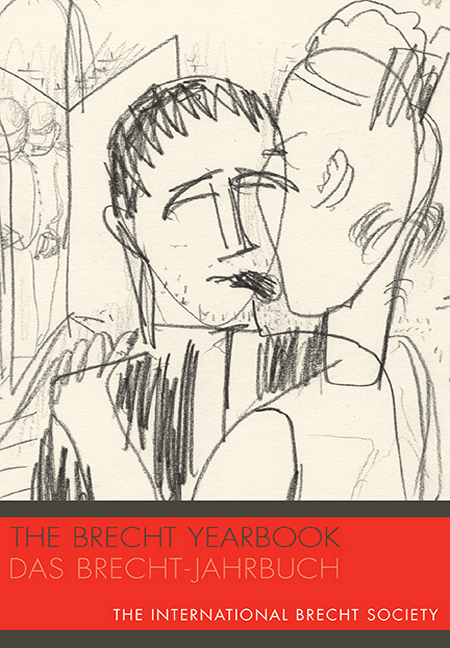Book contents
- Frontmatter
- Contents
- Editorial
- Tribute
- Documents from the Inaugural 24h DURCHEINANDER in Berlin
- Brecht-Images: Artist’s Introduction
- New Brecht Research
- The Temporality of Critique: Bertolt Brecht's Fragment Jae Fleischhacker in Chikago (1924–1929)
- Apparate und Körper: Überlegungen zu Bertolt Brechts Radiolehrstück Der Ozeanflug
- Wer ist Oscar? Ein unveröffentlichter Brief an Brecht vom 12. Juni 1918 aus schottischer Kriegsgefangenschaft
- “leg das buch nicht nieder, der du das liesest, mensch”: Brechts Gedicht “Die Nachtlager”
- Übersehen oder verbannt? Hanns Eislers Bilder aus der Kriegsfibel
- Special Insert: Accompaniments to Brecht, Music, and Culture
- Das “Wiedersehen”: Der chinesische Dichter und Germanist Feng Zhi und Bertolt Brecht
- Brechtian Challenges to Theater Artists during the Internal War in Peru
- “Good Woman should have been done in one of our big theaters long before this”: Brecht, the Students, and the Making of the New Wave of Australian Theater
- Mark Twain's “Magnanimous-Incident” Hero and Bertolt Brecht's Der gute Mensch von Sezuan
- Navid Kermani's Literary Reflections: On Kafka, Brecht, and the Koran
- Karl Kraus und Bertolt Brecht: Über die Vergleichbarkeit des Unvergleichlichen
- Book Reviews
- Notes on the Contributors
Mark Twain's “Magnanimous-Incident” Hero and Bertolt Brecht's Der gute Mensch von Sezuan
from New Brecht Research
Published online by Cambridge University Press: 11 March 2017
- Frontmatter
- Contents
- Editorial
- Tribute
- Documents from the Inaugural 24h DURCHEINANDER in Berlin
- Brecht-Images: Artist’s Introduction
- New Brecht Research
- The Temporality of Critique: Bertolt Brecht's Fragment Jae Fleischhacker in Chikago (1924–1929)
- Apparate und Körper: Überlegungen zu Bertolt Brechts Radiolehrstück Der Ozeanflug
- Wer ist Oscar? Ein unveröffentlichter Brief an Brecht vom 12. Juni 1918 aus schottischer Kriegsgefangenschaft
- “leg das buch nicht nieder, der du das liesest, mensch”: Brechts Gedicht “Die Nachtlager”
- Übersehen oder verbannt? Hanns Eislers Bilder aus der Kriegsfibel
- Special Insert: Accompaniments to Brecht, Music, and Culture
- Das “Wiedersehen”: Der chinesische Dichter und Germanist Feng Zhi und Bertolt Brecht
- Brechtian Challenges to Theater Artists during the Internal War in Peru
- “Good Woman should have been done in one of our big theaters long before this”: Brecht, the Students, and the Making of the New Wave of Australian Theater
- Mark Twain's “Magnanimous-Incident” Hero and Bertolt Brecht's Der gute Mensch von Sezuan
- Navid Kermani's Literary Reflections: On Kafka, Brecht, and the Koran
- Karl Kraus und Bertolt Brecht: Über die Vergleichbarkeit des Unvergleichlichen
- Book Reviews
- Notes on the Contributors
Summary
Scholars have produced an extensive list of precursors for individual figures, songs, and secondary themes in Bertolt Brecht's Der gute Mensch von Sezuan. However, no one has suggested a source for the overarching theme with which the piece both commences and ends—namely the impossibility of following the gods’ commandments (in short, “Gut zu sein”) while also continuing to survive (“und doch zu leben”). This theme, not part of Brecht's original conception of 1930, when his working title was Die Ware Liebe, became important in later versions, and was instrumental in introducing both the gods and much of the ensuing critical discussion of the play's content. In this contribution, I argue that the origin of this theme is to be found in a short work by Mark Twain. My purpose is to contribute to an understanding of the play's background, but I would also like to promote interest in investigating further the impact of Twain's work on German literature: on individual writers, the use of dialect in literary works, and more.
In May of 1878 the Atlantic Monthly published an essay by Twain, which was entitled “About Magnanimous-Incident Literature.” In it the narrator presents a series of four “charming anecdotes” concerning highminded and noble deeds, sentimental literature written “in the quaint vein of The World's Ingenious Fabulist,” which praises virtuous, generous, and benevolent individuals. Though he claims that such stories in the past have taught him a “lesson,” given him “pleasure,” and brought back his “self-respect” whenever he “thought meanly of [mankind],” the narrator now takes them beyond their “happy climaxes” to focus on their sequels or results. He concludes that magnanimity often leads to disastrous consequences and in the final analysis helps neither the benefactor nor the beneficiary.
The first of Twain's four anecdotes, “The Grateful Poodle,” tells of a dog with a broken leg who was healed by a benevolent physician—“who had read the books”—and who then passed his good fortune forward by bringing another broken-legged dog for treatment, each of whom then brought an additional dog, and so forth, until the physician was completely overwhelmed by claims upon his services.
- Type
- Chapter
- Information
- The Brecht Yearbook / Das Brecht-Jahrbuch 40 , pp. 190 - 199Publisher: Boydell & BrewerPrint publication year: 2016



